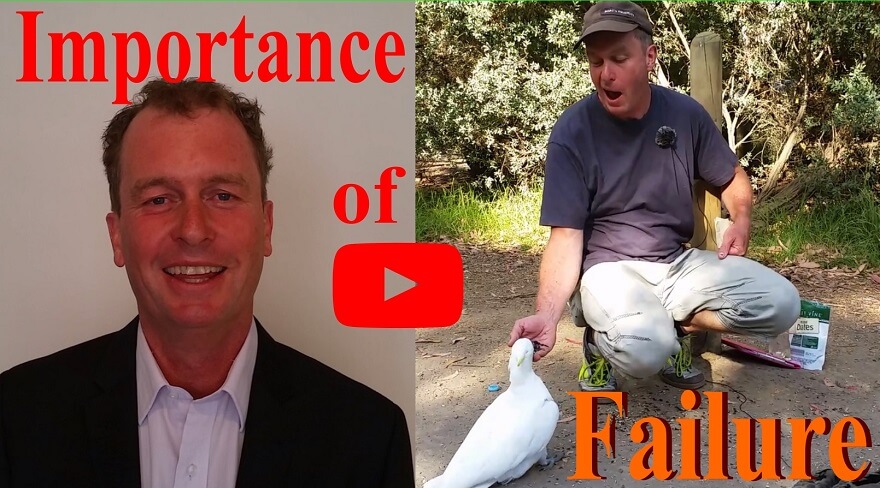Importance of Failure
Solving the learning and life equation
Anxiety, Depression and Failure
is avoidable in Learning & Life
The ABC News article 'Schools at Crisis Point'(1) mentioned the 'need to be perfect' is mentioned the 'need to be perfect' is impacting student performance. Peer pressure, needing to fit in, social media, high expectations and a range of other factors tend to narrow what is acceptable to the student. What is increasingly lost is the fundamental basis of learning; that of trial and error and the give it a go attitude. A baby learns to walk by falling over. They try over and over until they get it. They often laugh if they fall and parents react positively, unless it hurts, they will try again.
The above is a fun video on the need to be perfect, give it a go attitude, and the feedback cycle for improving and learning. Stress, anxiety, suppression and depression in many circumstances can be wiped away with the right attitude to learning and correct feedback to oneself or from another.
We all stuff up, and some circumstances can't be controlled. What is our attitude to to 'trying things' and not succeeding? How do our peers, parents, role models and teachers react when we do try something and don't reach ours or others expectations of us? Is is one of learning or one of failure? What is the gem of wisdom that can be gleaned from an error or outcome?
At university I got a fantastic final grade of "E" once. It did not mean 'E for enough', but that was my personal joke about it. The wisdom I gained was having photographic memory and understanding of the subjects theory was not good enough when the final exam was predominantly mathematical exercises that were in the text book. I must have got over 80% for the multiple choice theory questions in the final exam, but close to zero for the rest as I couldn't do the mathematical exercises. Lesson learnt; practice the exercises because that is what is in the exam! Practice then memorise the steps to the mathematical exercises. A costly waste of time and effort for an entire semester, but I learnt some valuable insights on planning and exam strategy.
I'm quite happy to put my bloopers up, post imperfect videos (more to come). It's a challenge and fun to see what crazy things happen with wild animals when I imperfectly film them as I explore and make the Learning Principles series of videos for this website, YouTube channel and Facebook page. As I re-watch them later I learn more about myself, making videos and the animals and their behaviour.
A natural outcome of the right attitude, feedback cycle, and knowing improvement is the key to success.
Other important factors to consider as a learner, that make perfection and desired grades difficult to achieve:
❖ Personal weaknesses
❖ Health issues, family situation and stress factors that can't be controlled or managed
❖ Oversights and assumptions (my E grade example above)
❖ Lack of life balance
❖ Food and hydration effects
❖ And many more, we are all unique
Use the feedback cycle to analyse your progress and test why expectations were not met.
For example improving my study techniques and memory abilities had a direct positive impact on my grades, motivation and confidence.
Personal weaknesses may not be easy to change, for example, my written English skills were shocking at high school and undergraduate university. It had a big impact on my grades. My partner at the time spent many hours helping me learn how to write better since she was a straight A+ student without effort. Writing is still my main weakness today and it requires constant effort and time. The most trying aspect of Post Graduate study and being in a PhD program was my writing ability.
Solution to failure
How can this be improved?
Parents and Teachers can assist by:
Providing a supportive environment for stuff ups.
Positively asking the student what they can learn from the outcome (even good outcomes can be improved).
Learn to communicate with the 'feedback sandwich' (Learning Principles video will be done on this).
Focus on gradual improvement and skill development, rather than a grade or desired outcome.
Students can help themselves by:
Choosing to see any attempt as a way to learn to do it better. Use feedback as a reflection of how to try it differently next time.
Using a Success Journal (webpage to come, magical but imperfect video is here). This helps focus the improvement attitude and many other aspects, as discussed in the video.
Brainstorm and test your assumptions.
Defining failure
The Neuroscience of learning
How do you define failure?
The definition of failure tends to impact how a person would treat any attempt at success. Above I shared how I got a final grade of E for one subject as I stuffed up the final exam. It was a failure in that moment, but the grade jump of over 20% the next year showed I could be successful. I was successful not only at the topic but also to learn and improve. It shocked me into the importance of looking more closely at exam strategy, planning and correct preparation.
This has also helped many students in the years since with those I taught in classes or tutored one-on-one. Was that E a fail or an amazing success?
My personal definition of failure is giving up and not learning to succeed in what I am aiming at. For example; I know I have succeeded at overcoming bullying, after facing so many of them in my life. In my last corporate role I maintained my Learning State non-stop for 10 months in a toxic work environment. That is a major achievement since I tend to be a leader in my chosen field, which often attracts naysayers and those predisposed to acting out bullying behaviours.
New ideas or things outside the norm such as Student Success Tutoring techniques tend to face ridicule by the uninformed.
As I mention in the about me page I was the first student ever at my university to write and use mind maps. On two occasions, during a lecture, I had my mindmaps ridiculed by the lecturers in front of 200 to 400 students. One lecturer picked up my mindmap out of curiosity, asked me a question about it and then then waved it in the air while ridiculing me and my note taking method.
Student Success Tutor approach
Using core Learning Principles ensures Student Success Tutoring is highly effective in assisting students to be competent learners, and then competent successful adults. The techniques and skills I share via tutoring embody the principles of how our psychology and neurology operate.
The key success factor to tutoring is the feedback process and the student trying the techniques. When the student uses these approaches and skills they gauge how it works. Then we explore it and re-try. Through this process the student discovers how they naturally operate, what their learning style is and how to improve both their strengths and weaknesses.
Rodger Federer does not stop trying to improve given he is an all time tennis great. He keeps his focus and training on getting better. We can all be the Rodger in our own lives, it is a choice. Once the skills and ethos is used it is quite easy to maintain. These techniques and approaches can always be picked up and used again when needed. This particularly applies to motivation as that operates in cycles. If my motivation and productivity drops I use the same things I teach to get myself going again.
Book a session now. Let's discuss an action plan
Individual online tutoring is limited to 12 students a week.
Book here. World-wide online.

